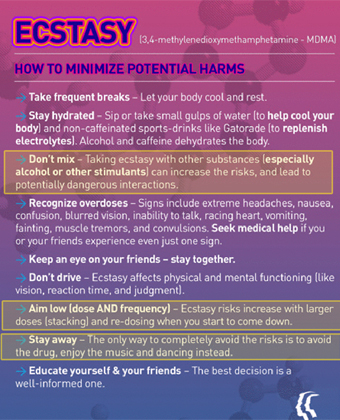A rave with a controversial past came to Orlando over the weekend — and with it came hundreds of doses of the MDMA drug “Molly,” a KnightNews.com investigation has concluded.

KnightNews.com talked with several UCF students who attended the Electric Daisy Carnival, known as EDC, and confirmed the drug use was widespread among UCF students. While many admitted they used it off the record, none agreed to have their name attached to it on the record, for obvious reasons.
“People smuggled them in their bras. The guys smuggled them in underwear,” a student who attended EDC told KnightNews.com on the condition of anonymity.
“Everyone is taking this drug for the first time, I swear,” the student, who admitted taking the drug, told KnightNews.com. “They want to experiment, try something new.”
KnightNews.com learned some UCF students got their supply of “Molly” from South Florida.
Most were not aware of the side effects. KnightNews.com researched MDMA and learned there are dangers that can be deadly. Sasha Rodriguez, a 15-year-old girl who attended EDC in Los Angeles last year, died of an overdose from MDMA.
According to the LA Times, “the ingestion of the hallucinogen caused Sasha to lose oxygen to her brain, leading to inactivity and death.”
She arrived to the hospital in a coma, after an ambulance ride where she had seizures. She also had abnormal heart rhythms before tests showed she had no brain activity and she was pulled off life support.
Video from the LA event: httpvh://www.youtube.com/watch?v=TUicv2RMvVc
During the LA event 120 people were hospitalized and 118 were arrested. In Orlando, there weren’t any similar reports. That could be due to how the City of Orlando, which owns and operates the location where EDC was held at Tinker Field, took steps to minimize the risk, such as forcing the event to end by midnight.
“We have looked at what happened in other cities and taken measures to ensure they don’t happen here in Orlando,” Heather Fagan, Mayor Buddy Dyer’s press secretary, told the Orlando Sentinel.
The students KnightNews.com talked to confirmed security was tight, but admitted it didn’t stop them from sneaking in MDMA and consuming multiple doses throughout the night. And when the rave ended downtown, many students came back to the UCF area for after parties.

It’s not yet clear if the spike in MDMA/Molly use among UCF students will die off now that EDC has left town, or continue now that students have tried it.
In LA, officials published a controversial flier acting as a guide on how to avoid complications with MDMA. It came under fire for giving tips on how to minimize risks while using MDMA, such as by avoiding combining caffeine and other stimulants while taking MDMA. The flier does point out the best way to stay safe is not to use it at all, but that advice wasn’t the most prominent.
EFFECTS, DANGERS OF MOLLY/MDMA
KnightNews.com researched the findings of the National Institute on Drug Abuse, which states: “MDMA can cause a dangerous increase in body temperature that can lead to kidney failure. MDMA can also increase heart rate, blood pressure, and heart wall stress. Animal studies show that MDMA can damage specific neurons in the brain. In humans, the research is not conclusive at this time; however, a number of studies show that long-term, heavy MDMA users suffer cognitive deficits, including problems with memory.”
Other side effects can include: nausea, chills, sweating, involuntary teeth clenching, muscle cramping, and blurred vision. The institute reports that MDMA overdose can also occur, which include symptoms like high blood pressure, faintness, panic attacks, and in severe cases, a loss of consciousness and seizures.
Even if you avoid the initial side effects, more can come over the course of the week following “moderate use of the drug,” according to the institute. Many MDMA users later report feeling emotions ranging from anxiety, restlessness, irritability and sadness that in some cases can be as severe as true clinical depression, the institute reports.
Research is unclear on whether MDMA is addictive, however, data indicates it can be in some cases. If you have an addiction you’d like to talk about, the UCF Counseling Center is available for free to answer any questions. The number is 407.823.2811.




